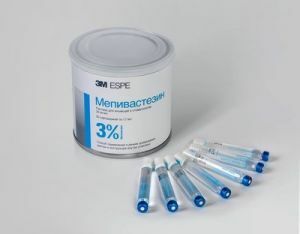 Mepivastesin( Mepivastesin) is a dental preparation for infiltration and conductive anesthesia.
Mepivastesin( Mepivastesin) is a dental preparation for infiltration and conductive anesthesia.
The drug is used in the case of tooth extraction without complications, with the preparation of the cavity, the treatment of the destroyed teeth for their restoration or before the installation of orthodontic structures.
As a rule, the medicine is prescribed for patients who have contraindications to vasoconstrictors.
Contents
- Form and Composition
- Pharmacological Action
- When should I apply?
- Contraindications to prescription
- Instruction for use
- Special instructions
- Adverse reactions and overdose
- Special patients
- Child age
- Pregnant women
- Lactation period
- Similar drugs
Form release and formulation
The product is available as a solution for injection. For 1ml of the drug is 30 mg mepivacaine hydrochloride.
The volume of one cartridge is 1.7 ml. Each package includes 50 cartridges.
The main components of the component:
- mepivacaine - active substance;
- water, sodium chloride - auxiliary substances.
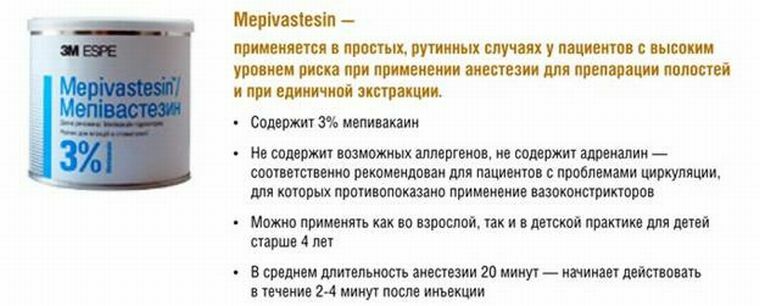
Pharmacological action
Mepivastesin is an anesthetic of local action, which stabilizes cell membranes.
When ingested in large amounts, it can depress the central nervous system. But if the dosage is observed, excitability and conductivity changes are not observed.
Sensitivity decreases after 3-15 minutes after drug administration. The anesthetic effect persists for 2-3 hours.
The time parameters of anesthesia depend on the following factors:
- type of anesthesia;
- the technique used;
- solution concentration;
- dosage of the drug;
- individual characteristics of the patient.
The drug after administration has a strong and rapid effect.
When should I apply?
The drug is used exclusively for local anesthesia. The following are the indications for prescribing:
- surgical interventions in the oral cavity;
- intubation of the trachea;
- bronchial, esophagoscopy;
- tonsillectomy.
Contraindications to the prescription of
The use of medication is limited to a number of contraindications:
- allergic reactions;
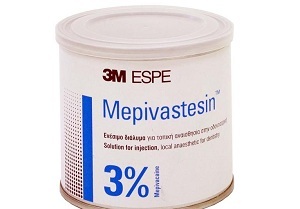
- intolerance of the drug components;
- hyperthermia of malignant form;
- severe myasthenia gravis;
- hepatic impairment;
- porphyria;
- heart failure;
- hypotension;
- epilepsy not treatable;
- age limit up to 4 years;
- old age.
Instruction for use
To achieve effective anesthesia, it is sufficient to use the minimum dosage of the drug. For patients of older age, a dose not exceeding 4ml is sufficient. In childhood, the amount of solution is taken from the calculation of body weight:
- 20-30 kg = 0.25-1ml;
- 30-45 kg = 0.5-2ml.
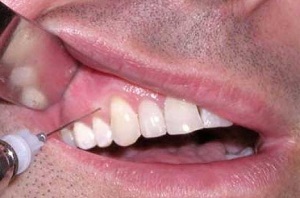 Elderly people are not recommended to use this medication because of the danger of exceeding the level of mepivacaine in the plasma. This is facilitated by a weak metabolic process, a slow spread of blood flow. Especially the risk of accumulation of this substance during repeated injections is great.
Elderly people are not recommended to use this medication because of the danger of exceeding the level of mepivacaine in the plasma. This is facilitated by a weak metabolic process, a slow spread of blood flow. Especially the risk of accumulation of this substance during repeated injections is great.
The same effect can provoke a general weakness of the patient, regardless of his age. In such situations, the dose of the drug should be reduced as much as possible, that is, a minimal dose of anesthetic should be administered to allow for anesthesia. In people with diseases such as atherosclerosis, angina, a reduction in the dosage of the drug is also required.
Special instructions
Mepivastesin is designed exclusively for professional dentists:
- Before you enter the drug, you must take a sample to identify a possible allergic reaction to the components of the anesthetic;
- is injected with the help of special syringes - cartridges that can be used repeatedly;
- requires the use of a syringe to disinfect the rubber plug, which is then punctured with an injection needle;
- it is not allowed to mix several medicines in a syringe;
- is not allowed to immerse cartridges in different solutions;
- mandatory compliance with the rate of administration of the drug at a rate of 0.5 ml in 15 seconds;
- after the injection, cartridges with residual solutions are destroyed.
Adverse reactions and overdose
When the introduction technology is violated, numerous negative reactions from the body are possible.
Nervous system:
- overexcitation;

- depression;
- headaches;
- ringing, tinnitus;
- general weakness;
- violation of speech, swallowing functions;
- decreased visual acuity;
- convulsions;
- coma.
If these symptoms occur, the patient should be placed in a supine position and ventilated with oxygen. After this, you need to closely monitor the patient in order to avoid possible deterioration.
Excitation of the body manifests itself for a short time. Basically, at first there is drowsiness, which gradually turns into an unconscious state. Most often, drowsiness provokes rapid absorption of the drug.
Cardiovascular system, blood:
- hypotension( in rare cases, hypertension);
- bradycardia;
- ventricular arrhythmia;
- cardiac arrest.
This symptomatology may result from an improper patient position or direct action of the anesthetic. Such a condition, as a violation of the pulse, can provoke cerebral hypoxia, convulsions. In this case, it is required to immediately put the patient and provide him with lung ventilation. It may also be necessary to administer vasoconstrictor drugs.
Allergic reactions:
- frequent sneezing;
- urticaria;
- prurit;
- of erythema;
- chills with fever;
- Quincke edema.
If there is a negative reaction, the injection of the anesthetic should be discontinued.
Other symptoms: shortness of breath, nauseating condition.
Symptoms of overdose:
- smack of metal in the mouth;
- dizziness;
- low blood pressure;
- nausea, vomiting;
- worry;
- tachypnea.
The negative reaction of the body is manifested when the concentration of anesthetic is exceeded in the blood. To provoke a side effect, a rapid administration of the agent or the accidental ingress of a needle with a solution inside the vessel can occur.
Symptoms of overdose are also manifested due to poor absorption of anesthesia due to the introduction of anesthesia into the inflamed area.
Special patients
Possibility of using anesthetic for anesthesia of special patients.
Childhood age
The introduction of the drug is allowed to children who reached the age of four. In the case of a child receiving Heparin or Aspirin, anesthesia is contraindicated.
With parallel administration of inhibitors, piercing the vessel during anesthesia can cause serious bleeding.
Pregnant women
 No studies have been conducted on the use of mepivacaine in pregnancy. Tests conducted on animals did not give a clear understanding of the effect of this substance on fetal development. It is known that the substance is able to penetrate the placenta.
No studies have been conducted on the use of mepivacaine in pregnancy. Tests conducted on animals did not give a clear understanding of the effect of this substance on fetal development. It is known that the substance is able to penetrate the placenta.
Specialists do not recommend taking this medication for the first three months of pregnancy, since the possibility of developing irreversible complications and fetal malformations is not ruled out.
But it is allowed anesthesia by this remedy in case it is forbidden to use other anesthetics. If possible, it is worthwhile to postpone treatment with the use of anesthetic until the end of pregnancy.
Lactation period
This is the same situation as with pregnancy. Studies of the possible entry of mepivacaine into breast milk have not been conducted.
Therefore, experts recommend the following scheme. After the introduction of anesthetic, breastfeeding should be resumed 24 hours after the procedure. During the day, carry out a decantation so that all toxic substances come out.
Similar drugs
In situations where patients have an individual intolerance to the components of the drug, analogues of the drug are selected, so 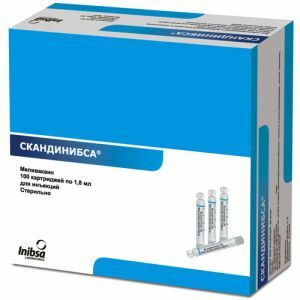 Mepivastezin can be replaced with the following anesthetics:
Mepivastezin can be replaced with the following anesthetics:
- Isokain;
- Mepivacaine;
- Mespidont;
- Mepicaton;
- Scandinibs;
- Scandinavian.
The price of mepivastine begins from 1500 rubles and above.
